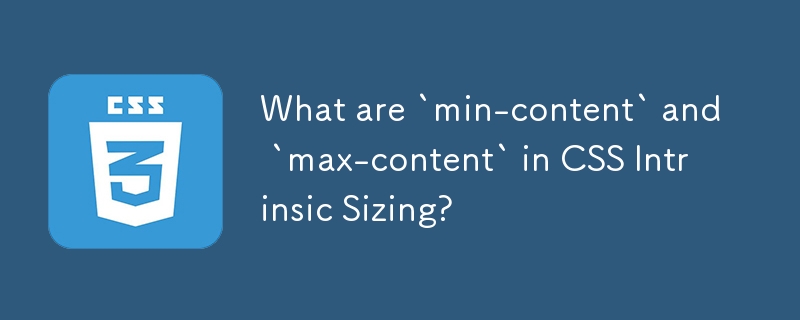

CSS sizing level 3 introduces the concept of intrinsic dimensions, which are calculated based on the content within a box rather than its parent. min-content and max-content are intrinsic properties that determine the minimum and maximum dimensions of a box, respectively.
An extrinsic dimension of a box is derived from its parent box's dimensions, such as width: 80%. In contrast, intrinsic dimensions, such as width: min-content, are determined by the content within the box itself.
min-content:
max-content:
To visualize min-content, consider a floating box (e.g., #red) within a wider containing box (e.g., #blue):
#blue { width: 0px; }
#red { float: left; }The min-content width of #red equals its width when #blue's width is 0px, ensuring that #red's contents do not overflow.
Similarly, for max-content, visualize #red floating within a very wide #blue:
#blue { width: 99999999999999999px; } /* ~infinite */The max-content width of #red equals its width when #blue's width is effectively infinite, allowing #red's contents to expand fully.
Other intrinsic properties are currently under development, including fit-content and stretch. Stay tuned for future updates on their final definition and implementation.
The above is the detailed content of What are `min-content` and `max-content` in CSS Intrinsic Sizing?. For more information, please follow other related articles on the PHP Chinese website!
 okex official website
okex official website
 How to retain the number of decimal places in C++
How to retain the number of decimal places in C++
 Registration-free CDN acceleration service
Registration-free CDN acceleration service
 Commonly used codes in html language
Commonly used codes in html language
 Introduction to screenshot shortcut keys in win8
Introduction to screenshot shortcut keys in win8
 How to make charts and data analysis charts in PPT
How to make charts and data analysis charts in PPT
 How to solve the problem that the phpstudy port is occupied
How to solve the problem that the phpstudy port is occupied
 Time recording software
Time recording software




